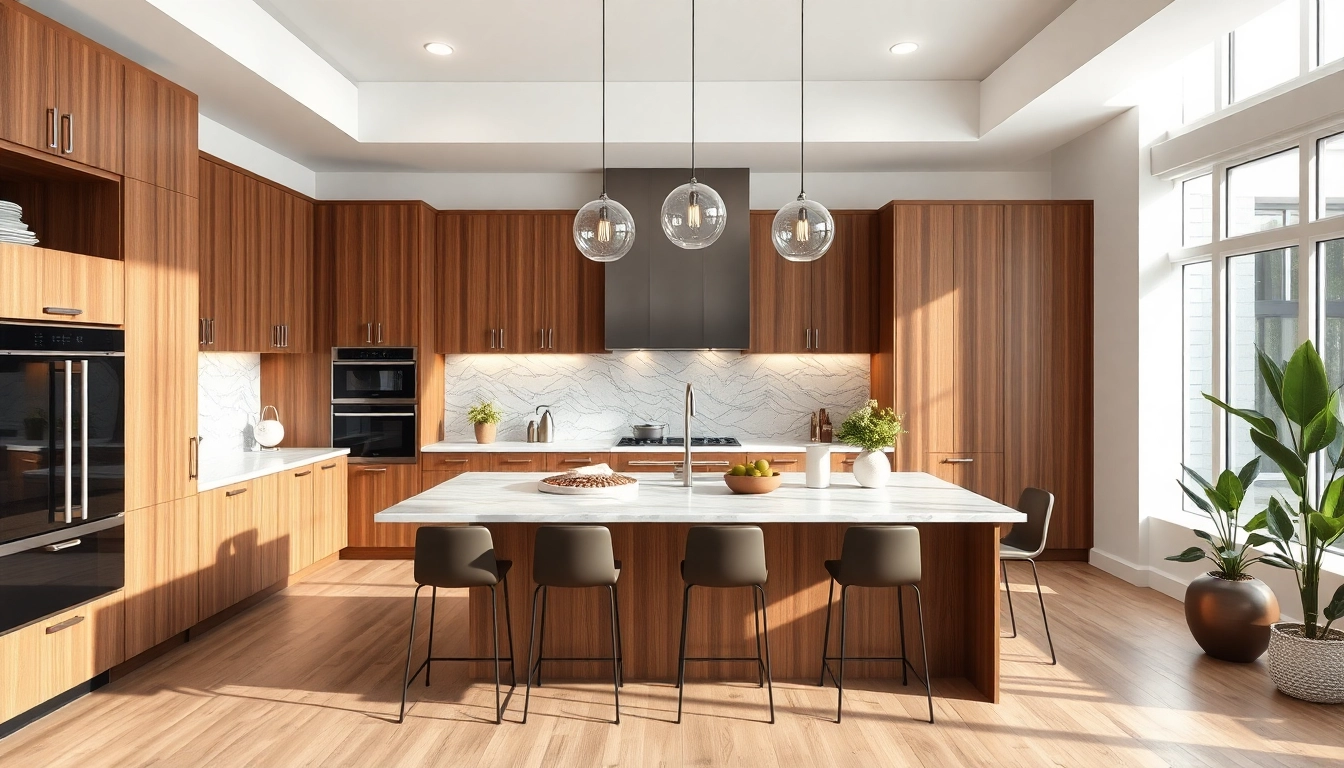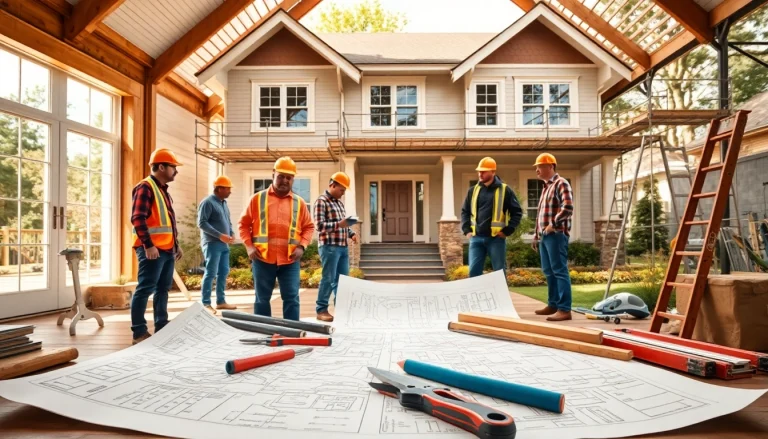Understanding the Basics of a Kitchen Remodel
What is a Kitchen Remodel?
A kitchen remodel involves substantial modifications to the structure, layout, and aesthetics of your kitchen space. Unlike minor updates, such as painting or replacing fixtures, a remodel can encompass anything from changing the floor plan to installing new cabinets and countertops. Essentially, it aims at improving functionality and enhancing the overall appeal of one of the most utilized areas in our homes. If you are considering a kitchen remodel, understanding what exactly it entails is the first step toward a successful transformation.
Key Benefits of Remodeling Your Kitchen
Remodeling your kitchen has a plethora of benefits, from enhancing your home’s functionality to increasing its market value. Here are some significant advantages:
- Improved Aesthetics: A remodel allows you to update the look of your kitchen to match modern styles or personal tastes, making it more inviting for family and guests.
- Increased Efficiency: Enhanced kitchens often feature up-to-date appliances, maximizing energy efficiency and reducing electricity costs.
- Enhanced Functionality: Remodeling often involves reconfiguring the layout to improve workflow, making cooking and hosting easier.
- Higher Home Value: Kitchen remodels are known to provide a high return on investment, making your home more appealing to potential buyers.
Common Kitchen Remodel Challenges
While remodeling a kitchen can be rewarding, it doesn’t come without hurdles. Some common challenges include:
- Budget Overruns: It’s easy to go over budget due to unexpected costs, so having a solid financial plan is essential.
- Choosing the Right Materials: With so many options available, knowing which materials will best meet your needs and budget can be overwhelming.
- Dealing with Contractors: Finding reliable contractors can be a significant challenge, and miscommunication can lead to undesirable outcomes.
- Disruption to Daily Life: A kitchen remodel can disrupt your routine, with demolitions putting cooking on hold for days or weeks.
Setting a Realistic Budget for Your Kitchen Remodel
Average Cost of Kitchen Remodels in 2023
The cost of a kitchen remodel can vary widely based on various factors including location, size, and scope of work. According to recent data, homeowners spend between $32,574 and $77,939 for a medium to large kitchen remodel. Basic updates might see costs closer to the lower end, while expansive renovations may push towards the higher end. It is essential to align your expectations with local market conditions.
Strategies to Save Money on Remodeling
If you want to manage costs effectively during a kitchen remodel, consider these budget-friendly strategies:
- Prioritize Projects: Focus on changes that will add the most value to your home and enhance your kitchen’s functionality.
- Opt for Refurbishment: Rather than replacing cabinets, refinishing or painting can be a cost-effective alternative to getting a fresh look without the hefty price tag.
- DIY Where Possible: Taking on small tasks yourself—like painting or installing hardware—can significantly reduce labor costs.
- Use Open-Box or Discounted Items: Check for sales, clearance items, or open-box deals on appliances and materials to save money.
Factors Affecting Your Remodeling Cost
Several variables can impact your remodeling costs, including:
- Kitchen Size: Larger kitchens typically incur higher costs due to more materials and labor required.
- Quality of Materials: The choice between high-end finishes and standard materials can greatly affect overall expenses.
- Labor Costs: Depending on your location, contractor labor rates can vary significantly, adding to the project’s overall cost.
- Design Complexity: Intricate designs or custom layouts can result in higher expenses due to the increased sophistication of work needed.
Design Ideas to Enhance Your Kitchen Space
Modern Trends in Kitchen Design
Staying abreast of current trends can help ensure your kitchen remains modern and stylish. Some trends worth considering include:
- Open Concept: Many homeowners are opting for open concept designs that integrate the kitchen with adjoining spaces, creating a more social atmosphere.
- Smart Kitchens: Technology now plays a significant role, so integrating smart appliances and systems enhances both functionality and efficiency.
- Eco-Friendly Designs: Sustainable materials and energy-efficient appliances are becoming increasingly popular, aligning with a growing awareness of environmental concerns.
Color Schemes and Materials to Consider
The colors and materials you select can dramatically influence the look and feel of your kitchen. Incorporating timeless colors like white, gray, or beige can evoke elegance, while vibrant colors can introduce energy and vitality. In terms of materials, options such as natural stone countertops or bamboo cabinetry not only contribute to visual appeal but can also enhance durability.
Maximizing Space in Smaller Kitchens
For those with limited kitchen space, clever design solutions can greatly enhance functionality:
- Vertical Storage: Utilize wall-mounted shelves or tall cabinets to keep essentials within reach while minimizing clutter.
- Multi-Functional Furniture: Consider installing an island with built-in storage or choose dining tables that can serve dual purposes.
- Light Colors: Opting for lighter colors on walls and cabinets can create the illusion of a more spacious area.
Planning Your Kitchen Remodel Project
Steps to Plan Your Kitchen Layout
A well-planned kitchen layout is crucial to maximizing functionality. Here are the steps to follow:
- Assess Your Needs: Consider how you use your kitchen—whether you cook daily, entertain frequently, or need ample storage for bulk items.
- Define Your Work Triangle: The space between the stove, sink, and refrigerator should be efficient, generally allowing for a pathway of no more than 26 feet.
- Visualize Your Space: Utilize design software or sketches to experiment with different layouts before settling on a final design.
How to Choose the Right Contractors
Selecting the right contractor can make or break your remodel. Here are considerations to keep in mind:
- Check Credentials: Ensure that contractors are licensed, insured, and have strong references.
- Review Portfolios: Look through past projects to determine if their style aligns with your vision.
- Obtain Multiple Estimates: Comparing prices and approaches from several contractors can give you insight into the market and ensure competitive pricing.
Permits and Regulations for Kitchen Remodeling
Know what permits you may require for your remodel, as construction laws vary by location. This often includes permits related to electrical, plumbing, and structural changes. Failure to secure necessary permits can lead to fines and complications, so it’s crucial to consult local regulations before starting work.
Post-Remodel: Maintaining Your New Kitchen
Essential Maintenance Tips for Your Kitchen
After you’ve completed your remodel, maintaining its appeal and functionality is key. Here are some essential maintenance tips:
- Regular Cleaning: Implement a routine to regularly clean surfaces, appliances, and fixtures to preserve their condition.
- Address Issues Promptly: Tackle any minor repairs immediately to prevent them from escalating into larger issues.
- Seasonal Inspections: Periodically check areas like plumbing for leaks and appliances for performance, especially before major cooking seasons.
Long-term Care for Cabinets and Countertops
Your cabinets and countertops require special attention to prolong their life:
- Use Non-Abrasive Cleaners: For cabinets, opt for gentle cleaning solutions to avoid damaging finishes.
- Seal Stone Counters: Regularly sealing natural stone countertops is necessary to protect against stains and moisture.
Handling Common Issues After a Remodel
Common post-remodel issues include poor water pressure, faulty appliances, or obvious warping of surfaces. To address these:
- Assess Water Systems: Regular maintenance on plumbing can help alleviate issues with water pressure.
- Consider Warranties: Ensure that new appliances come with warranties for easy replacement or repair if they malfunction.























+ There are no comments
Add yours